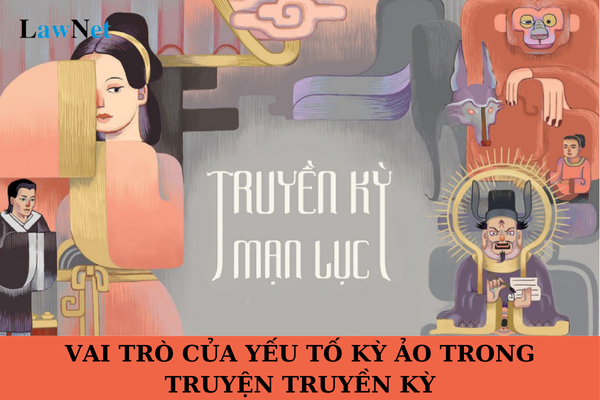What is the role of the fantasy element in legendary tales of Vietnam? What literary knowledge does the 9th-grade Literature curriculum in Vietnam cover?
What is the role of the fantasy element in legendary tales of Vietnam?
Legendary tales are a genre of medieval prose narrative that combines realism and fantasy to reflect human life. The fantasy element plays an important role in contributing to the artistic value and content of the work. Below are the roles of the fantasy element in legendary tales:
|
Roles of the Fantasy Element in Legendary Tales
1. Creating Attraction and Engaging the Reader
The fantasy element makes the story interesting and stimulates the reader's imagination. Supernatural phenomena such as ghosts, deities, the return of the dead, or mysterious miracles make the story unique and unpredictable.
Example: In the tale "Chuyện Người Con Gái Nam Xương" (The Tale of Nam Xuong's Daughter) by Nguyen Du, the image of a shadow on the wall seen by little Dan is a fantastical detail that enhances the mystery and tragedy of the story.
2. Reflecting Concepts of Karma and Good vs. Evil
Legendary tales are deeply influenced by Buddhist, Confucian, and Taoist philosophies, particularly the concept of karma. The fantasy element is used to emphasize the rule "good meets good, evil meets evil." Virtuous characters are often helped by deities, while evil ones are punished by spirits.
Example: In the tale "Chuyện Chức Phán Sự Đền Tản Viên," Ngo Tu Van dares to burn an evil temple, showcasing his integrity. With the help of divine beings, he defeats the malicious spirit of a wicked general and is appointed a judge in the underworld.
3. Indirectly Reflecting Reality
Under feudal policies, directly criticizing society could endanger the author. Therefore, they often used the fantasy element to weave in real-world issues such as injustice, grievances, and human fate. Through the supernatural world, authors can express their critical views without fear of censorship.
Example: "Chuyện Yêu Quái Ở Xương Giang" tells of the wrongful ghost of soldiers killed in war. It is not just a fantastical story but also reflects the suffering of innocent people in chaos.
4. Demonstrating the Feudal Worldview and Belief in the Supernatural
In feudal society, people believed in the existence of deities, ghosts, and destiny. Legendary tales with fantastical elements clearly reflect this worldview. Mysterious phenomena such as divine assistance, ghostly harm, and the intervention of the underworld in the human world show the prevalent beliefs of the time.
Example: The tale "Chuyện Cây Gạo" is about the vengeful ghost of a wronged girl haunting the kapok tree, bringing misfortune to passersby. While mystical, it reflects the folk belief in the spiritual world.
5. Enhancing the Aesthetic and Artistic Value of the Work
Thanks to the fantasy element, the space and time in legendary tales are expanded. Characters can move between the world of the living and the underworld, between the human world and the world of deities. This makes the story unrestricted by reality, becoming more rich, whimsical, and full of creativity.
Example: In the tale "Chuyện Đối Đáp Của Người Tiều Phu Ở Núi Na," the main character meets with deities and discusses life philosophies. This is how the author uses the fantasy element to vividly express their ideas.
Conclusion
The fantasy element not only enhances the appeal of legendary tales but also carries profound meanings. It helps the work reflect reality, illustrate the concept of karma, build the worldview of people during the feudal era, and elevate artistic value. Thanks to these elements, legendary tales have enduring vitality and leave a deep impression on readers.
|
Note: Content is for reference only

What is the role of the fantasy element in legendary tales of Vietnam? What titles will be awarded to 9th-grade students in Vietnam? (Image from the Internet)
What literary knowledge does the 9th-grade Literature curriculum in Vietnam cover?
According to the General education program in Literature issued with
Circular 32/2018/TT-BGDDT, the 9th-grade Literature curriculum in Vietnam covers the following literary knowledge:
- Imagination in literary works
- Titles and the way to set titles for texts
- Themes and topics, how to determine themes; structures
- Plot, context, characters, language in comedy, historical stories
- Single-line plots and multi-line plots
- The main artistic techniques of satirical poetry
- Some poetic elements of thất ngôn bát cú and tứ tuyệt luật Đường poetry: structure, adherence, rules, rhyme, rhythm, parallelism
- Elements of form in a poem: words, images, structure, emotional flow
- Conflict, action, characters, dialogue, satirical techniques in dramatic literature (comedy)
- Form elements of free verse (six, seven syllables): number of lines, syllables, rhyme, rhythm
- Readers and personal reception of a literary text
- Content reflected and perspective on life and people of the author.
What titles will be awarded to 9th-grade students in Vietnam?
Under Article 15 of Circular 22/2021/TT-BGDDT:
Commendations
1. Principals shall award certificates of achievement for students
a) End-of-year commendation
- Award the title “Học sinh Xuất sắc” (Excellent student) for students who have obtained Excellent training and learning results for the entire school year and achieved DTBmcn of at least 9.0 in subjects that are assessed via both feedback and scores.
- Award the title “Học sinh Giỏi” (Good student) for students who have obtained Excellent training and learning results for the entire school year.
b) Commend students for having unexpected merits in training and learning in the school year.
2. Students with special achievements shall be considered and requested for commendation by schools.
9th-grade students can be awarded two titles, "Excellent Student" and "Good Student," at the end of the year if they meet the conditions for training and learning results.
Additionally, if 9th-grade students achieve unexpected merits in training and learning in the school year, the Principal can award a certificate of merit. Students with special achievements shall be considered and requested for commendation by schools.


